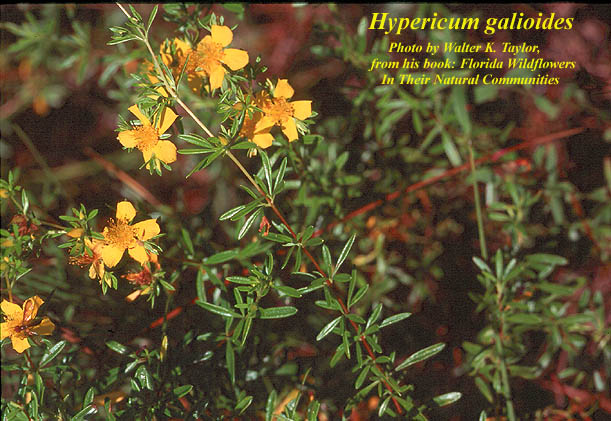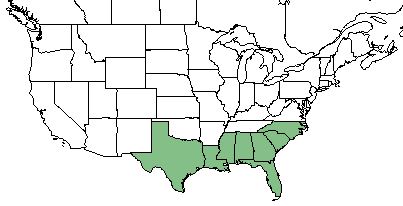Hypericum galioides
Common Names: bedstraw St. Johnswort [1]
| Hypericum galioides | |
|---|---|

| |
| Photo by the Atlas of Florida Plants | |
| Scientific classification | |
| Kingdom: | Plantae |
| Division: | Magnoliophyta - Flowering plants |
| Class: | Liliopsida - Moncots or Magnoliopsida - Dicots |
| Order: | Theales |
| Family: | Clusiaceae |
| Genus: | Hypericum galioides |
| Species: | H. galioides |
| Binomial name | |
| Hypericum galioides Lam. | |

| |
| Natural range of Hypericum galioides from USDA NRCS Plants Database. | |
Contents
Taxonomic Notes
Synonyms: H. ambiguum Elliott.[2]
Varieties: none.[2]
Description
G. galioides is a perennial subshrub in the Clusiaceae family that is native to North America. [1]
Distribution
H. galioides is found throughout the southeastern United States, specifically in Florida, Georgia, South Carolina, North Carolina, Alabama, Louisiana, Mississippi, and Texas. [1]
Ecology
Habitat
H. galioides is commonly found in wet pine savannas and flatwoods, pools, edges of bottomlands. [3], and lowlands. [4] Specimens of the species have been collected from habitats including edge of swampy woods, moist loamy sands near a vernal pool, low wet swale in a prescribed fire pine region, pine plantation, oak hammock, and longleaf pine savanna. [5] It is listed by the USDA Natural Resources Conservation Service as an obligate wetland species that is almost exclusively found in wetland habitats.[1]
Associated species include Cyrilla parviflora, Salix humilis, Cephalanthus occidentalis, Saccharum sp., Dichanthelium scoparium, Smilax rotundifolia, Proserpinaca pectinata, Hypericum crux-andreae, and others.[5]
Phenology
H. galioides generally flowers from June until August.[3] It has been observed flowering in May and June. [6]
Seed bank and germination
This species was not found in the seed bank even though herbaceous vegetation was found in longleaf pine sites.[7]
Fire ecology
H. galioides has been observed in areas that are frequently burned.[5]
Conservation, cultivation, and restoration
Cultural use
Photo Gallery
References and notes
- ↑ 1.0 1.1 1.2 1.3 USDA Plant Database
- ↑ 2.0 2.1 Weakley, A.S. 2015. Flora of the southern and mid-atlantic states. Working Draft of 21 May 2015. University of North Carolina at Chapel Hill, Chapel Hill, North Carolina.
- ↑ 3.0 3.1 Weakley, A. S. (2015). Flora of the Southern and Mid-Atlantic States. Chapel Hill, NC, University of North Carolina Herbarium.
- ↑ Brockway, D. G. and C. E. Lewis (1997). "Long-term effects of dormant-season prescribed fire on plant community diversity, structure and productivity in a longleaf pine wiregrass ecosystem." Forest Ecology and Management 96: 167-183.
- ↑ 5.0 5.1 5.2 URL: http://herbarium.bio.fsu.edu. Last accessed: June 2018. Collectors: Loran Anderson, R.K. Godfrey, R.A. Norris, R.F. Doren, R.Komarek, William Platt, Cecil Slaughter, Palmer Kinser, Richard Carter, W. Baker. States and counties: Florida (Wakulla, Levy, Calhoun, Gadsden, Leon, Liberty, Baker, St. Johns, Gulf) Georgia (Decatur, Thomas) Louisiana (Beauregard)
- ↑ Nelson, G. PanFlora: Plant data for the eastern United States with emphasis on the Southeastern Coastal Plains, Florida, and the Florida Panhandle. www.gilnelson.com/PanFlora/ Accessed: 22 MAY 2018
- ↑ Cohen, S., et al. (2004). "Seed bank viability in disturbed longleaf pine sites." Restoration Ecology 12: 503-515.